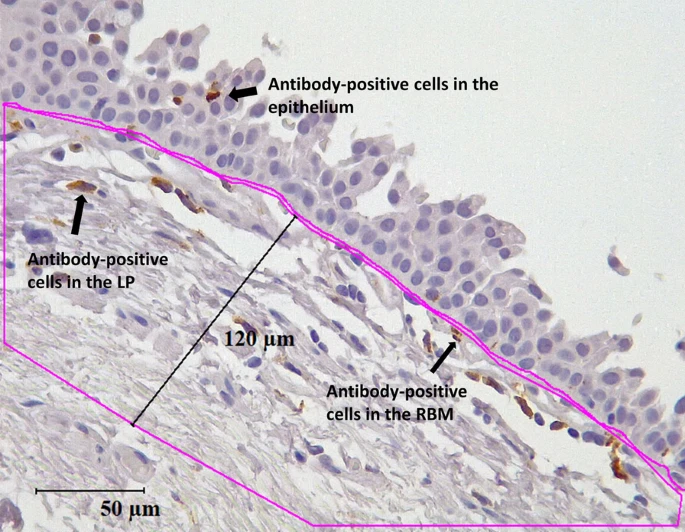
Representation of antibody-positive cells that were counted in the epithelial,
reticular basement membrane (RBM), and lamina propria (LP) areas
Abstract

reticular basement membrane (RBM), and lamina propria (LP) areas
Background
Although asthma and chronic obstructive pulmonary disease (COPD) are two distinct chronic airway inflammatory diseases, they often co-exist in a patient and the condition is referred to as asthma-COPD overlap (ACO). Lack of evidence regarding the inflammatory cells in ACO airways has led to their poor prognosis and treatment. The objective of this endobronchial biopsy (EBB) study was to enumerate inflammatory cellular changes in the airway wall of ACO compared with asthma, COPD current smokers (CS) and ex-smokers (ES), normal lung function smokers (NLFS), and non-smoker controls (HC).
Methods
EBB tissues from 74 patients were immunohistochemically stained for macrophages, mast cells, eosinophils, neutrophils, CD8+ T-cells and CD4+ T-cells.
The microscopic images of stained tissues were evaluated in the epithelium, reticular basement membrane (RBM) cells/mm RBM length, and lamina propria (LP) cells/mm2 up to a depth of 120 µM using the image analysis software Image-Pro Plus 7.0. The observer was blinded to the images and disease diagnosis. Statistical analysis was performed using GraphPad Prism v9.Results
The tissue macrophages in ACO were substantially higher in the epithelium and RBM than in HC (P < 0.001 for both), COPD-ES (P < 0.001 for both), and -CS (P < 0.05 and < 0.0001, respectively). The ACO LP macrophages were significantly higher in number than COPD-CS (P < 0.05). The mast cell numbers in ACO were lower than in NLFS (P < 0.05) in the epithelium, lower than COPD (P < 0.05) and NLFS (P < 0.001) in RBM; and lower than HC (P < 0.05) in LP. We noted lower eosinophils in ACO LP than HC (P < 0.05) and the lowest neutrophils in both ACO and asthma. Furthermore, CD8+ T-cell numbers increased in the ACO RBM than HC (P < 0.05), COPD-ES (P < 0.05), and NLFS (P < 0.01); however, they were similar in number in epithelium and LP across groups. CD4+ T-cells remained lower in number across all regions and groups.
Conclusion
These results suggest that the ACO airway tissue inflammatory cellular profile differed from the contributing diseases of asthma and COPD with a predominance of macrophages.

No comments:
Post a Comment